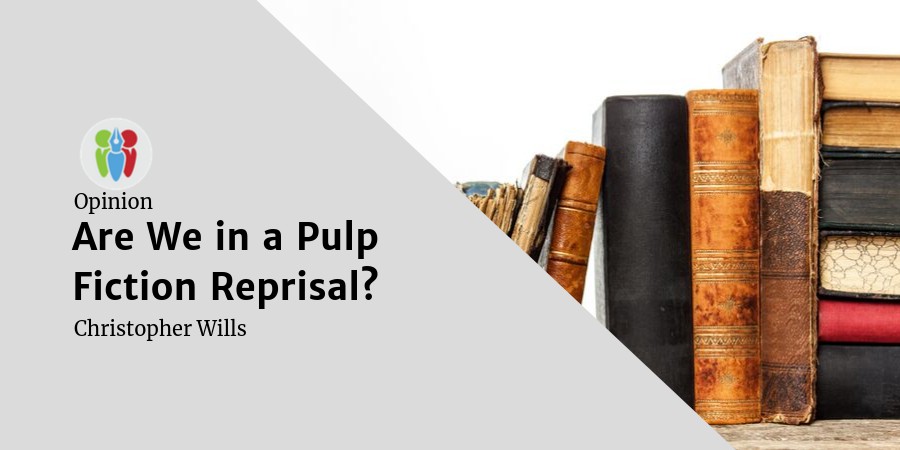You'd be forgiven for thinking technology has eradicated the days of old. But not so fast, author member Christopher Wills has a different opinion. He's here to examine the similarities between the current ebook era and the early twentieth century pulp fiction era.
Let me start by clarifying that I'm not suggesting ebooks are pulp fiction; I am suggesting the current ebook era has  similarities with the pulp fiction era.
similarities with the pulp fiction era.
What is Pulp Fiction?
Pulp paper was made from cheap wood pulp which was widely available in the 19th century. Pulp paper is still used today in newspapers, magazines and yes… toilet paper.
In 1896 the fiction magazine, The Argosy, was published on pulp paper with untrimmed edges and no images inside or on the cover. It was eight pages of serialized fiction. Within ten years it was a weekly magazine selling 500,000 copies every issue.
The pulp fiction era is considered to have been between 1896 and 1939, although if one includes cheap paperback books printed after the war, one could suggest the era continued until the 1950s. Paper shortages during the Second World War brought a decline in magazine sales and after 1945, new paperback publishers, comic books and television helped continue the decline in pulp magazines.
Modern Technology
In 2004, Sony released the Librie in Japan which is acknowledged to be the first ebook reader with an electronic ink display.
However the ebook era probably started in 2007 with Amazon’s issue of their first ebook reader, the Kindle. The name came from the idea of kindle as fuel to start a fire, so the Kindle was a metaphor for fuelling the love of reading. Wood kindle is like wood pulp – spooky. The first Kindle sold out in 5 hours.
The ebook was possibly invented in 1949 although that was a mechanical device so maybe it should be called an m-book. Another version of an ebook was invented in the 1960s but that was based on an IBM mainframe computer so it wasn’t very portable.
Comparing Pulp Fiction with Ebooks
So what are the comparisons between the pulp fiction era and the current ebook era?
Pulp fiction made it cheaper to publish and sell short stories and serialized fiction which created a boom in magazine publishing, meaning many more people were able to write for a living and many more people were able to access their writing by buying the cheap pulp magazines. Ebooks have made it much cheaper to be able to publish short stories and novels which has led to a boom in publishing, meaning many more people are able to write for a living and many more people are able to buy fiction to read.
The staples of early pulp fiction were the many short story magazines like Argosy, Black Mask and Amazing Stories where writers were paid by the word. Longer stories meant more income for writers. Kindle Unlimited pays writers by page reads which is effectively paying writers by the word. More pages equals more income for writers.
Some pulp fiction writers were writing huge numbers of words per day; some wrote up to 8,000 words. Imagine writing 8,000 words on a typewriter every day. That must have been before RSI was invented! Today many ebook writers write a few thousand words every day and some “write” even more using voice to text technology.
This is a bit more productive than the famous quote attributed to traditional authors such as Flaubert, Wilde and Conrad:
“I spent all morning putting in a comma and all afternoon taking it out.”
Some pulp fiction writers had more than one pen name as they wrote in more than one genre. Some ebook writers today use more than one pen name for the same reason.
During the pulp fiction era writers were paid on acceptance for magazine stories and the rates of payment were agreed in advance. This transparency and speed of payment helped with the payment of bills. Today one advantage ebook authors have over traditional writers is the quick payment of money for sales and the transparency of the amount of money earned.
Pulp magazines and books developed amazing colourful book covers which clearly defined the genre of the stories inside. To sell ebooks one is encouraged to get amazing colourful book covers that clearly define the genre of the stories one is writing.
What About Genre Fiction?
But one might ask, hasn’t this always been true of books?
No. Go to your bookshelf, or your parents’ bookshelf or a library bookshelf and look at the covers of some older paperback books in some genres. Some are amazing and well designed, but many are not. I looked up ‘James Bond book cover art' and discovered a variety of styles. Some paperback James Bond books had no images on the cover at all; they only had text stating the title and writer.
Book covers have always been designed but only in the last thirty years or so have some traditional book covers started to conform to genre styles. Think Chicklit or Mislit. Some genres like Science Fiction and Westerns have always had a genre style image on the cover.
During the pulp fiction era new genres were created and these genres became established as part of the fiction canon. A couple of examples are Science Fiction and Hard Boiled Detective stories. Today in the ebook era many new genres and sub-genres have been created and have become established such as Paranormal Romance and Military Science Fiction.
In Summary
So there are similarities between the pulp fiction era and the current ebook era. Some may have concerns that comparisons between the two eras could introduce the idea of ebooks being labelled as pulp fiction.
Let’s examine this briefly. Many great writers wrote stories for pulp fiction magazines to supplement their incomes and as part of learning their craft. These include:
- Agatha Christie
- Louis L’Amour
- Edgar Rice Burroughs
- Isaac Asimov
- Arthur C Clarke
- Joseph Conrad
- Raymond Chandler
- Philip K Dick
- F Scott Fitzgerald
- Dashiell Hammett
- Robert A Heinlein
- Frank Herbert
- Rudyard Kipling – Nobel Prize for Literature
- Elmore Leonard
- Sinclair Lewis – Nobel Prize for Literature + offered but declined the Pulitzer Prize for Literature
- H P Lovecraft
- Upton Sinclair – Pulitzer Prize for Literature
- Micky Spillane
- Mark Twain
- H G Wells
- Tennessee Williams.
Personally I would not consider it an insult if my name was associated with those writers. What do you think?
Are We in a Pulp Fiction Reprisal? #indieauthor #selfpublishing #IARTG #ASMRG #writingcommunity Share on X
OVER TO YOU
Do you think we're having a pulp fiction renaissance? Or do you think this is a different era all together?
If you enjoyed this post, you might like these from the ALLi archive:





Thoughts provoked: My blog’s consistent hit leader is a five-part serial — seea, tres, multo Pulpy — that I wrote over a consecutive day stretch with minimal editing, and even less pearl-clutching and hand-wringing. I just stuck it out there, five mornings in a row. Pulp has virtues unsung, including immediacy and broad reader appeal.
I also wondered what if mags hired writers on a term basis, as members of a writer stable. Let’s say terms (variable and negotiable) are $200 per story, paid on receipt, a minimum of four stories per year. Benefits for both mag & writer: audience loyalty, rep building, findability, brand co-mingling, mutual support and got-yer-backism.
Hi Chris- loved this piece. When I began my writing career I floundered and somehow wrote a couple short stories using the same characters. I put them out, for free, just to see and was surprised at how many downloads they got and how many reviews (good and bad). I realized then, that what I had done wasn’t much different that Robert E. Howard or H.P. Lovecraft. That led to the realization that with ebooks, it seemed we were entering a new pulp fiction era. I can’t say I’ve definitively proven that, but it seems you’ve had similar thoughts, so I’ll take comfort that the track I’ve been on isn’t a total bust/waste. 🙂
Thanks for your comments. It goes to show that nothing is new. Isaac Newton once said he didn’t think up anything original and that his ideas (Newton’s Laws of Physics) came from him “standing on the shoulders of giants.” The interesting thing is that not even this quote was new because somebody had already said it 400 years before him. Recently I tried to create a pen-name for myself. Almost every variation on a theme I chose was already taken. And most highly successful authors are sued by someone who clams their bestselling original story was clearly based on a school homework or similar, written by the person suing.
Thanks for a very interesting article.
I write ‘holiday reading’ books of short stories and thrillers and have self publlished.
I am rethinking my ‘genre’.’
What I mean is ,perhaps I should be offering my work to short story magazines rather than shoving them into Amazon main categories
I firmly believe short stories have a place in the modern reader’s library…the commuter/bedtime reader/etc
Any suggestions very welcome!
PP
Short story books are very difficult to sell unless your name is Stephen King or Ernest Hemingway etc. Short stories of mine have been published in anthologies alongside some great writers but the anthologies sold few copies, in some cases less than a hundred. That is not a lot when you consider twenty authors equates to a lot of family and friends.
A suggestion, and I haven’t tried this but I am going to. Is write short stories based on a big story or a place like a village or university campus. This might work well in Romance. Ignore my numbers I’m just speculating. Write 14 connected or themed stories this way of about 7K words each. So if you chose Romance around a university campus, each story would be different and complete but after you have written them all, sort them in order the take the main characters and give them bit parts in the other stories, like a mesh. Best not to contradict an earlier story so if you have a Happy Ever After in story one don’t have one of the main characters pop up in story eight at the funeral of their loved one; that might upset the Romance reader.
Once the 14 are all complete, edited etc. Use rapid release and publish one on January 1st then one every 28 days meaning you will be publishing one ever 4 weeks for a year at £0.99 each ebook only. Current wisdom (it may change and it may not even be true) is that Amazon promotes series books if they are published inside a 30 day time frame from the previous one.
An advantage of this is you can use the same cover each time with a different title. Then after the year is up give it a few months and publish the entire collection under one cover.
As I say this is only an idea and it might not work but I know that in general short story books don’t sell and the magazine short story market is dying and is nothing like it was in the 1980s where one could earn an income from it in the UK alone.
Good luck.
I find this whole analogy strangely comforting. Like we have not all actually just jumped off a literary cliff into possible chaos, but instead are part of some cohesive evolution that makes sense. I like it!
You are right, it is comforting. I am comforted by the idea that history repeats and evolves thus making it more likely we (Indie writers) will survive as long as we are part of the evolution process.